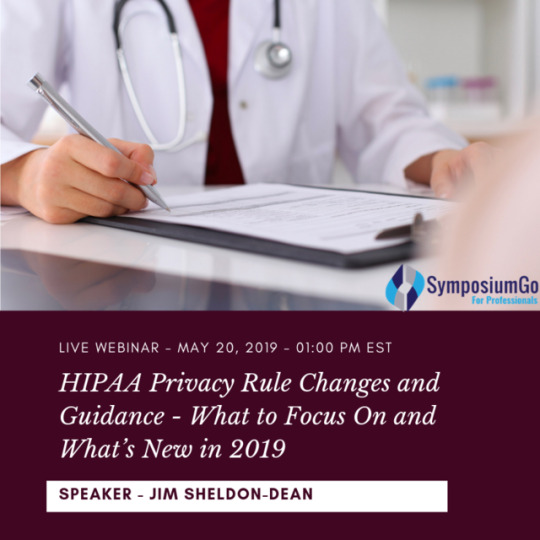Photo

All about HCPCS!
Join @lynnanderanin in her latest webinar on #HCPCS Coding ABC’s on Aug 7th.
& Learn the HCPCS
1⃣The drug table
2⃣Current CMS DME audits
3⃣Coding & pricing
4⃣Reimbursement
➡️Use LI30 & get $30 off!
Click below to attend:
https://www.symposiumgo.com/webinar/hcpcs-coding-abcs?utm_source=img
1 note
·
View note
Text
HIPAA Audit Checklist: Is Your Hospital Prepared For The Next HIPAA Audit?
HIPA is universally an agreed-upon process, created to protect sensitive and confidential patient data in the healthcare industry. But, is following HIPAA enough to prepare you for the random audits?
HIPAA, the Health Insurance Portability and Accountability Act, was enacted by the United States Congress in the year 1996. The primary objective was to protect the confidential data of the patient.
HIPAA was mainly initiated to set concrete and detailed standards regarding the secure and uninterrupted flow of sensitive patient data. It is mandatory for an organization to meet HIPAA compliance in order to function permissibly in the healthcare industry. The law has established proper standards which demand maximum confidentiality, security, and utilization of Protected Health Information (PHI) or ePHI. PHI is a health information record-keeping tool in the form of physical as well as an electronic system which helps in identifying a patient or a healthcare plan member in the system.
The advent of the two new ePHI rules has benefitted the healthcare information services (HIS) with a rapid shift in the process of billing, coding as well as in the method of record-keeping. The proposed rules have given a giant push to the control on the privacy of the data and information, fully in the hands of the patients. The amount of paperwork eliminated has initiated developed techniques like electronic passbooks of patients, better analytics tools in chronic treatments along with efficient billing and coding process.
Why is the confluence of HITECH and HIPAA Act considered essential?
Whether you are a business associate, covered entity, hospital, or any other medical practitioner in the healthcare industry, you are legally abided to follow both HITECH and HIPAA Act.
As part of the American recovery and reinvestment act (ARRA) of 2009, HITECH act was instituted into law in February of 2009. The act was enforced merely to promote the adoption of it in healthcare, i.e., to encourage the hospitals and other healthcare organization to inculcate maximum use of electronic health records (EHR). The act was purposely initiated to rigorously enforce the regulations and standards of HIPAA, which somehow weren’t being correctly followed by the organizations.
In addition to the penalties under the HIPPA act, HITECH also required health and human services HHS to regularly investigate the breaches under any willful violations under HIPAA rule. The HITECH act included another layer of security in the provision of HIPAA. It increased the protection of patient data by applying stringent legal liability for non-compliance of the law.
With this, in the year 2011, HITECH also introduced the practice of monetary incentives for the appropriate and abundant use of electronic health record (EHR). The process of monetary incentives was introduced to encourage more use of technology in hospitals. The design of the reward program has worked wonders in healthcare information services as the whole system started to infuse the use of it in their everyday work.
The changing pace of hospital and their compliance with HIPAA- How HIPAA auditing kept medical practitioners on their toes.
The HHS Office for Civil Rights (OCR) has embodied the responsibility of conducting periodic audits of covered entities and business associates. The blueprint of HIPAA audit was originated in the year 2001 to ensure full compliance with HIPAA regulation. The audit program worked through a set of policies which selects a random sampling method of auditing to keep all the healthcare organizations updated and in compliance.
Having regular audits helps an organization to strengthen its privacy and security structure by detecting the place of disclosure of phi. According to OCR, audits are an essential compliance tool for the organizations to roll with all the latest security measures.
The HIPAA audit protocol by OCR is an effort to ensure that the required entities are meeting the HIPAA compliance proactively. It is a protocol where the spectrum of the audit includes an examination of the documents, identification of potential risks, investigation, review, and reporting of the consent documents.
Components and Timeline of HIPAA Audits
Before filing for an audit program, one must be aware of all the procedural actions by the OCR. The program consists of a systematic timeline to ensure a balanced and orderly audit of the organization. For audit protocols to take place, an organization must be legally working in the healthcare industry. Moreover, the auditees must be able to show how they are complying with the HIPAA breach notification rule.
So, Are You One Of The Auditees? - To comply with the audit program, you must come under any of the following heads mentioned below;
• Covered entities like healthcare clearinghouses, insurance providers, etc
• Business associates such as billing and faxing companies, practice management firms, third-party consultant, physical and cloud storage providers.
• An organization (public or private) affiliating with a healthcare entity.
Timeline of HIPAA Audit
1. Firstly, the auditees are divided into various sections of size, operation, affiliation, etc. Next; the OCR selects the organization from the process of sampling and avoids entities with an open and extensive investigation complaint as they are already undergoing the procedure.
2. Once an organization is selected for a HIPAA audit, it is mandatory that they send the requested data to the OCR through the mail within ten business days from the date of the request.
3. The documents requested should be submitted in a digital form and after that sent electronically through a secured online portal.
4. After reviewing the documents, the auditor will send back the findings to the entity. The organization will then have ten business days to review and respond with a statement, if any, to the auditor.
5. Subsequently, the auditor will report the final audit within 30 business days and will also be obliged to send a copy of the report to the concerned auditees.
The Outcome Of The HIPAA Audit Protocol: What happens Once Your Firm Has Been Audited?
Once the final audit is out, the OCR will examine the entity’s reasons for non-compliance with HIPAA as well as HITECH Act. Following the OCR will plan to guide the entity through the necessary changes and compliances needed. If, in any case, OCR finds any compliance issue more severe than others, then they have all the rights to send it for further investigation.
The importance of a HIPAA audit is mainly to ensure that people are regularly complying with federal law or not. And if you are, then the audit program will just enhance your organization’s performance for further reimbursement.
To Summarize
The importance of a HIPAA audit is mainly to ensure that people are regularly complying with federal law or not. And if you are, then the audit program will enhance your organization’s performance for further reimbursement. HITECH act has also contributed to the better functioning of hospitals.
Even though there is an element of sampling in the audit process, the hospitals must comply with the law. HIPAA audit is an initiation by the OCR too ensures that the healthcare organizations are making sure that the patient’s data are secured and not leaked in any way possible.
Even after complying with all the rules and regulation of HIPAA, an organization can still come under the radar of HIPAA audit, if a complaint gets filed against it. The filed complaint can be made by an unsatisfied patient, an internal whistleblower, or anyone apprehensive of the working of a healthcare organization.
0 notes
Link
At SymposiumGo, check out the latest Live webinar - HCPCS Coding ABC’s, the key points are HCPCS, DME, Drugs, Braces, and S-codes. For more details, visit our website and attend this webinar on Aug 07, 2019. Use LI30 code to get $30 Off.
0 notes
Link
Read our blog to learn about the new medical coding 2019 changes. Topic included are - CPT and HCPCS changes, latest updates on new codes, E/M changes and a lot more about medical coding. Come and check out the latest Live Webinars on medical billing and coding at SymposiumGo.
0 notes
Photo

Wednesday Webinar!
Join #Toni_G_Cesta in her upcoming Live Webinar - Compliance Measures for RN and Social Work Case Managers.
Attend on: June 26, 2019
For: 60 min
& free your practice from all the compliance issues.
Use SG50 & get $50 off!
Click here to attend.
0 notes
Photo

Tuesdays for Toni!
Join #Toni_G_Cesta in her latest webinar on Transitions in Care – A Key Role for RN Case Managers and Social Workers.
Key Points:
Discharge planning
IMPACT Act
Patient Choice
Use SYM & get $30 off!
Click below to Attend
https://www.symposiumgo.com/webinar/transitions-in-care-a-key-role-for-rn-case-managers-and-social--workers?utm_source=img
0 notes
Photo

Is your office an E-office yet?
Join Samantha Fowler in her Live Webinar - Are You Empowering Paper(less)?
Attend the session on June 12, 2019, & convert your office into an e-office.
0 notes
Photo

Join Toni G Cesta in her new Live webinar - Transitions in Care
Points:
IMPACT Act
Patient Choice
CMS survey with CoP
Case Management department strategies
Multidisciplinary Rounds
Use SYM & get $30 off!
0 notes
Link
Check out our latest blog on the buzzing topic of 3D printing in the Healthcare Industry. Read the blog to know how 3D printing has reformed the industry in its various facets. Also, learn how changing technology is changing your medical practice with each passing year. Come and enhance your professional knowledge and medical practice with SymposiumGo.
0 notes
Link
SymposiumGo blogs are updated regularly and encompass a wide range of topics in the healthcare industry. This blog focuses on the 6 Stages of Revenue Cycle Management to Make Your Hospital Financially Sound. Visit our website and read the full blog and learn how a perfect revenue cycle can make the hospital financially fit!
0 notes
Photo

Attend our Live Webinar by Jim Sheldon & learn all the latest changes in the HIPAA privacy rule 2019.
Also,
Ransomware
42 CFR Part 2
HITECH Act
Use SYM30, get $30 off!
0 notes
Photo

Join #Samantha_Fowler in her latest and most talked-about webinar on creating a paperless office.
An E-office is a must in the healthcare industry, more so when it elevates patient care.
Join the live session on May 08, 2019
Click here to explore more.
0 notes
Link
The recent breakthrough In CoP by CMS is all the industry is talking about. Know all the latest inside reforms for 2019 and all the outdated and updated changes in your medical practice. Visit SymposiumGo to read the full blog.
0 notes
Link
At SymposiumGo, we have prominent speakers like Lynn Anderanin. Lynn, CPPM, CPMA, CPC-I, COSC, is the Senior Director of Coding Education for Healthcare Information Services. She has over 36 years of experience in all areas of the physician practice and particularizes in Orthopedics. Lynn is currently a Workshop and Audio Presenter. She is also the founder of her Local Chapter of the AAPC. Hope to see your participation there!
0 notes
Photo

Webinar alert!
Come and attend our latest Live Webinar and update your spine surgery coding practice. Speaker - Lynn Anderanin Also, learn about the latest CMS guidelines in coding. Click below and visit us today!
1 note
·
View note
Link
Jim Sheldon-Dean, Speaker at SymposiumGo is a frequent speaker regarding HIPAA, including speaking engagements at numerous regional and national healthcare association conferences and conventions and the annual NIST/OCR HIPAA Security Conference. Read more about our speaker and his webinars.
0 notes
Link
Medical coding principally translates healthcare record, diagnosis, reports, medical services and systems into specific alphanumeric codes. It is centrally the process of translating extensive medical data and services into efficient and uncomplicated code.
Follow the link and check out the full blog to read more.
0 notes